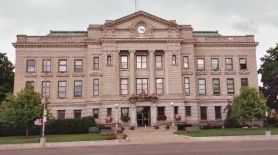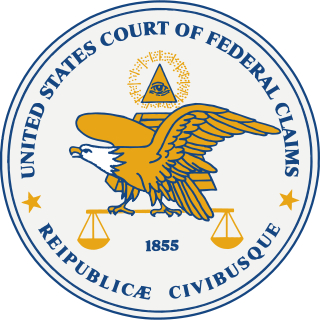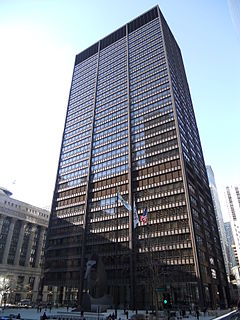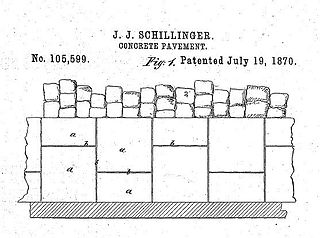
The United States district courts are the trial courts of the U.S. federal judiciary. Each federal judicial district has at least one courthouse, and many districts have more than one. Most decisions of district courts may be appealed to the respective court of appeals of their circuit, with a small number instead being appealable to the Federal Circuit, or directly to the Supreme Court.

Stump v. Sparkman, 435 U.S. 349 (1978), is the leading United States Supreme Court decision on judicial immunity. It involved an Indiana judge who was sued by a young woman who had been sterilized without her knowledge as a minor in accordance with the judge's order. The Supreme Court held that the judge was immune from being sued for issuing the order because it was issued as a judicial function. The case has been called one of the most controversial in recent Supreme Court history.
An administrative law judge (ALJ) in the United States is a judge and trier of fact who both presides over trials and adjudicates claims or disputes involving administrative law.

The United States Court of Federal Claims is a United States federal court that hears monetary claims against the U.S. government. It was established by statute in 1982 as the United States Claims Court, and took its current name in 1992. The court is the successor to trial division of the United States Court of Claims, which was established in 1855.
In the United States, qualified immunity is a legal principle that grants government officials performing discretionary (optional) functions immunity from civil suits unless the plaintiff shows that the official violated "clearly established statutory or constitutional rights of which a reasonable person would have known". It is a form of sovereign immunity less strict than absolute immunity that is intended to protect officials who "make reasonable but mistaken judgments about open legal questions", extending to "all [officials] but the plainly incompetent or those who knowingly violate the law". Qualified immunity applies only to government officials in civil litigation, and does not protect the government itself from suits arising from officials' actions.
Judicial immunity is a form of sovereign immunity, which protects judges and others employed by the judiciary from liability resulting from their judicial actions.
The Speech or Debate Clause is a clause in the United States Constitution. The clause states that members of both Houses of Congress
...shall in all Cases, except Treason, Felony and Breach of the Peace, be privileged from Arrest during their attendance at the Session of their Respective Houses, and in going to and from the same; and for any Speech or Debate in either House, they shall not be questioned in any other Place.
Mitchell v. Forsyth, 472 U.S. 511 (1985), was a United States Supreme Court case deciding on the issue of immunity of cabinet officers from suits from individuals.

The Circuit Court of Cook County is the largest of the 24 judicial circuits in Illinois as well as one of the largest unified court systems in the United States — second only in size to the Superior Court of Los Angeles County since that court merged with other courts in 1998.

Schillinger v. United States, 155 U.S. 163 (1894), is a decision of the United States Supreme Court, holding that a suit for patent infringement cannot be entertained against the United States, because patent infringement is a tort and the United States has not waived sovereign immunity for intentional torts.
Dennis v. Sparks, 449 U.S. 24 (1980), was a case in which the Supreme Court of the United States held that individuals who bribed a judge for an injunction were not protected by judicial immunity and therefore could be held liable for the damages resulting from the injunction.
In United States law, absolute immunity is a type of sovereign immunity for government officials that confers complete immunity from criminal prosecution and suits for damages, so long as officials are acting within the scope of their duties. The Supreme Court of the United States has consistently held that government officials deserve some type of immunity from lawsuits for damages, and that the common law recognized this immunity. The Court reasons that this immunity is necessary to protect public officials from excessive interference with their responsibilities and from "potentially disabling threats of liability."

In United States law, the federal government as well as state and tribal governments generally enjoy sovereign immunity, also known as governmental immunity, from lawsuits. Local governments in most jurisdictions enjoy immunity from some forms of suit, particularly in tort. The Foreign Sovereign Immunities Act provides foreign governments, including state-owned companies, with a related form of immunity—state immunity—that shields them from lawsuits except in relation to certain actions relating to commercial activity in the United States. The principle of sovereign immunity in US law was inherited from the English common law legal maxim rex non potest peccare, meaning "the king can do no wrong." In some situations, sovereign immunity may be waived by law.
United States v. Bormes, 568 U.S. 6 (2012), is a decision by the Supreme Court of the United States holding that the Little Tucker Act, which provides jurisdiction to federal courts for certain claims brought against the federal government, does not apply to lawsuits brought under the Fair Credit Reporting Act (FCRA).
The Judiciary of Virginia is defined under the Constitution and law of Virginia and is composed of the Supreme Court of Virginia and subordinate courts, including the Court of Appeals, the Circuit Courts, and the General District Courts. Its administration is headed by the Chief Justice of the Supreme Court, the Judicial Council, the Committee on District Courts, the Judicial Conferences, the Judicial Inquiry and Review Commission, and various other offices and officers.
Halperin v. Kissinger was a court case filed by Morton Halperin against National Security Advisor Henry Kissinger, who approved wiretapping Halperin's home and White House office. The wiretaps continued for 21 months, from May 1969 until February 1971.

Harris v. Harvey 605 F.2d 330 was a landmark decision on judicial immunity, brought under the Civil Rights Act. In it, the United States court of appeals for the Seventh Circuit ruled that intentional acts of public defamation inspired by racial prejudice are not judicial functions, thus establishing that neither judicial or prosecutorial immunity protects a judge who uses the power of their state office to engage in such acts. It has been cited as the first case in the United States where a sitting court judge was sued and lost in a civil action. As decision of the Seventh Circuit, the case is binding precedent in Illinois, Indiana, and Wisconsin, and has been used as persuasive authority in other appellate and district courts.
Jam v. International Finance Corp., 586 U.S. ___ (2019), was a United States Supreme Court case from the October 2018 term. The Supreme Court ruled that international organizations, such as the World Bank Group's financing arm, the International Finance Corporation, can be sued in US federal courts for conduct arising from their commercial activities. It specifically held that international organizations shared the same sovereign immunity as foreign governments. This was a reversal from existing jurisprudence, which held that international organizations had near-absolute immunity from lawsuits under the Foreign Sovereign Immunities Act and the International Organizations Immunities Act.
Opati v. Republic of Sudan, 590 U.S. ___ (2020), was a United States Supreme Court case involving the Foreign Sovereign Immunities Act with its 2008 amendments, whether plaintiffs in federal lawsuits against foreign countries may seek punitive damages for cause of actions prior to enactment of the amended law, with the specific case dealing with victims and their families from the 1998 United States embassy bombings. The Court ruled unanimously in May 2020 that punitive damages can be sought from foreign nations in such cases for preenactment conduct.
Pierson v. Ray, 386 U.S. 547 (1967), was a United States Supreme Court case in which the Court first introduced the justification for qualified immunity for police officers from being sued for civil rights violations under Section 1983, by arguing that "[a] policeman's lot is not so unhappy that he must choose between being charged with dereliction of duty if he does not arrest when he had probable cause, and being mulcted in damages if he does."







